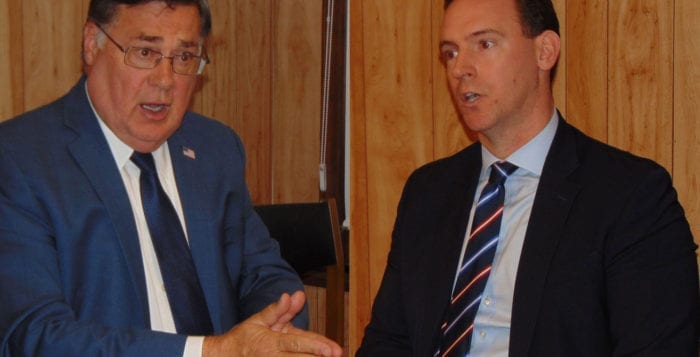Residents, community groups and elected officials gathered at William Sidney Mount Elementary School auditorium Sept. 16 to discuss pertinent issues in the Town of Brookhaven at an event hosted by the Stony Brook Concerned Homeowners Ltd and Friends of Stony Brook Road.
Topics discussed at the meeting were the progress on Stony Brook Road, the latest on the Gyrodyne Property and student rentals.
The latest on Stony Brook Road
Lee Krauer, president of the Friends of Stony Brook Road, said the group is frustrated with Town of Brookhaven highway superintendent, Dan Losquadro (R), and the work being done on the road.
“We have requested so many meetings with him [Losquadro] to discuss the issues that we need to discuss,” she said. “He came to the meeting last year and told everyone there that we would have sand and concrete on the medians. Does anybody see it?”
Krauer said according to Losquadro the reason behind not having the concrete medians is because the Highway Department doesn’t have enough money in the budget for them.
She also expressed frustration with Stony Brook University.
“The university involvement is nil, they don’t care about Stony Brook Road,” Krauer said.
Currently, Stony Brook Road is undergoing a $1.9 million makeover that will see repairs and work done on sidewalks, drainage systems, turning lanes and traffic signals among others. Work is scheduled to be completed by the middle of October.
The Gyrodyne property situation
The fate of the Gyrodyne property has been a concern for many residents, since the developers announced plans in 2017 to subdivide the 62 acres of land in St. James, also known as Flowerfields, to construct a 150-room hotel with a restaurant and day spa, two medical office buildings and a 220-unit assisted living complex with its own sewage treatment facility.
Many in the area have raised concerns about the amount of traffic that would empty out onto Route 25A and Stony Brook Road if an additional exit was made accessible on the east side.

Cindy Smith, of the Greater Stony Brook Action Coalition, spoke on the status of the Gyrodyne development.
“There will be tremendous traffic on 25A and development has the potential to dump traffic on Stony Brook Road,” she said.
Smith said despite the parcel being on Town of Smithtown property the traffic burden will be felt by Brookhaven residents.
Smithtown “would reap the tax property revenue while Brookhaven foots the bill, and we have to deal with the quality of issues like traffic, noise, dust and safety issues,” she said.
Town of Brookhaven Supervisor Ed Romaine (R) said he opposes additional development on that parcel.
“We are doing all we can to see if the county would be willing to purchase some of that land,” he said. “This could have a tremendous impact on the community, I am opposed to opening up the roads between Gyrodyne and the university.”
Romaine said it would have dire consequences on Stony Brook Road.
“I am prepared to seek legal action as town supervisor to prevent roads from being opened,” he said.
Student boarding houses/rentals
Off-campus student boarding houses have been an issue for Three Village residents, though in recent years with help from the town and SBU the amount of these houses that pop up in the community has been curbed.

Bruce Sander, of Stony Brook Concerned Citizens, said the organization is glad at seeing this success but reiterated more can be done.
He said some of the blame still falls on the university for not adequately providing enough student housing on campus, especially for first-year students.
Sander also mentioned that international students and others don’t want to pay for the school’s meal plan, which is considered too expensive, and have found a way around living on campus.
“The university needs to increase housing on campus,” he said.
An idea previously brought by Romaine would have SBU require all non-commuter students who are freshmen to be mandated to live on campus.
For more information about the Stony Brook residents organizations, visit:
- www.stonybrookconcernedhomeowners.com
- www.friendsofstonybrookroad.com
- greaterstonybrookactioncoalition.weebly.com.

















